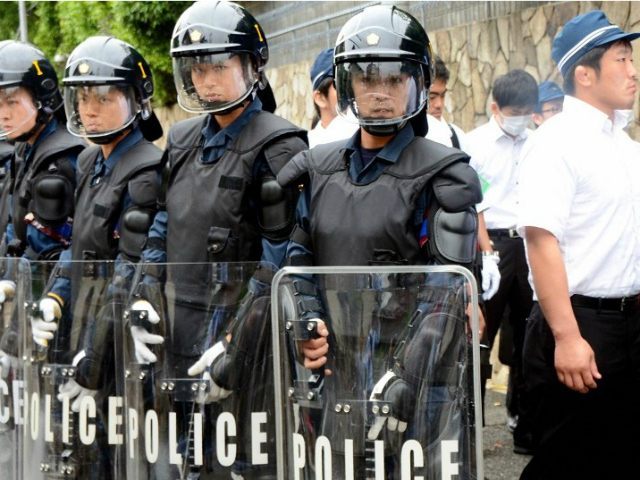Japan’s National Police Agency has announced the creation of a special central headquarters to address what is now being described as a “state of war” between rival factions within a yakuza organized crime syndicate. The war arrives as Japan struggles to address a growing population crisis worsened by the ongoing aftermath of the Fukushima nuclear disaster.
Japan’s Asahi Shimbun describes the situation as a “nationwide yakuza war,” listing 16 incidents of violent crime in the past six months that have raised significant alarm among Japanese police. The warring factions at the Yamaguchi-gumi, the largest yakuza organization in Japan, and the breakaway Kobe Yamaguchi-gumi, a group within the organization that has grown disenchanted with their leadership and diminishing economic opportunities within the group.
Asahi notes police have documented 49 incidents in which one of the two groups were the intended targets of attack, including “four firearm incidents, three Molotov cocktail attacks and nine episodes of vehicles being rammed into gang offices.” Most recently, on March 3, a member of the Yamaguchi-gumi identified as Akira Matsubara was arrested for driving an SUV into a home believed to belong to the head of the Kobe splinter group.
Police called an emergency meeting on Tuesday, after which they announced the creation of a new agency to address yakuza crime specifically.
Unlike American mafia organizations, the yakuza are not inherently illegal despite their various illegal activities. They are treated, the Wall Street Journal described in September, as social clubs comparable to the American Rotary or Kiwanis clubs. Hence they have their own official building headquarters, which have become targets of attack in recent months.
Once operating mostly legally as labor organizations, the Yamaguchi-gumi became an organized crime syndicate following World War II and remains the largest of the nation’s mob organizations. It hosts its own website, where the group posts videos dedicated to “ninkyo,” or chivalry, and promotes various allegedly charitable events run under its auspices. The website is called the “Banish Drugs and Purify the Nation League.”
The website debuted two years after the group launched an official magazine, hoping to soften its image with the average Japanese citizen. The Yamaguchi-gumi newsletter “has an entertainment section detailing fishing trips by top officials, along with satirical haiku – the traditional Japanese form of poetry – and pieces on the board games Go and Shogi.” The official magazine joined an array of widely-available yakuza fan magazines published by independent groups.
The Wall Street Journal notes that the Yamaguchi-gumi in particular has struggled to keep revenue high as police have increased anti-yakuza activities. “Clampdowns against the yakuza have been enforced at all points, making it increasingly difficult for them to rack up profits,” Yoshiaki Shinozaki, an organized crime attorney, told the newspaper. The split between the central group and the Kobe Yamaguchi-gumi is the climax of such difficulty.
In addition to making the activities in question — business shakedowns and illegal trade, among others — more difficult, police raids appear to have dissuaded many members of yakuza groups from staying in the business. The Japan Times recorded a 40 percent drop in Yamaguchi-gumi membership in 2015. Including the Kobe splinter group, the newspaper noted that “as some members chose to go straight as a result of the breakup, the combined membership of the two groups dropped by some 1,500 to around 8,800.”
Police began to monitor the split between the groups even more closely in October, when the Yamaguchi-gumi announced in an extensive apology that they would not be able to host their annual Halloween trick-or-treat event for children. A month later, Tatsuyuki Hishida, a high-ranking Yamaguchi-gumi member, was found beaten to death in his home.
A mob war may impact an already ailing Japanese economy, struggling to survive despite a massive decline in population. Japan’s population dropped by one million people in the past five years and appears to continue dwindling, as workplaces fail to reconcile the increase in female employees with accommodations for workers who wish to start families. The problem is even more severe in Fukushima prefecture, where five years ago most of the population was evacuated due to a nuclear disaster. In a nation where many families rely on the father for their complete income, men had to choose between joining their families in evacuating or keeping their jobs in affected areas, tearing couples apart and decreasing their odds of having more children.

COMMENTS
Please let us know if you're having issues with commenting.